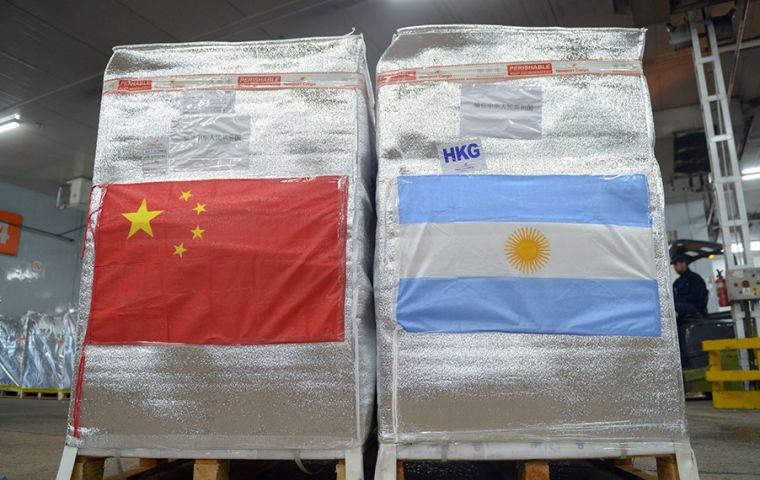MercoPress. South Atlantic News Agency
Argentina has become a Chinese Yuan testing ground in trade and investment
 Argentine exports to China in the first seven months of 2021 reached US$ 3,35bn, mostly grains and meats, while imports totaled a US$ 3,35bn surplus for Beijing
Argentine exports to China in the first seven months of 2021 reached US$ 3,35bn, mostly grains and meats, while imports totaled a US$ 3,35bn surplus for Beijing Following several currency swaps by which China has helped to support the Argentine central bank depleted international reserves, the administration of president Alberto Fernandez intensified relations with Beijing and a year ago allowed transactions between the two countries to be made in Yuan.
The Argentine central bank has not supplied information on such transactions, but analysts believe that most of the bilateral trade which reached US$ 10,2bn in the seven months of this year were done with the Chinese currency.
When China is pushing for a greater role of her currency in global finances and trade, Argentina in fact has already become a test ground for such aspiration. However as a member of Mercosur, the initiative so far has been limited to Argentina.
With a country and its people accustomed to work and protect their peso savings converting them in US dollars given the Argentine endemic financial crises, it's hard to see Argentines changing to the Yuan among other reasons because of insufficient liquidity and in the Americas the greenback is king. This nevertheless should not be an impediment for an international testing of the Yuan in trade and finance, at least in countries in deep problems.
According to Michel Alaby, a consultant in international relations Argentina needs the currency swap mechanism to ensure its reserves, particularly with a significant trade deficit with China, and for Beijing it's a promising test ground
Argentine exports to China in the first seven months of this year reached US$ 3,35bn, mostly grains and meats, while imports totaled US$ 6,9bn. According to Alaby & Asociados, the balance difference must be paid in US dollars, meaning that China finally received US$ 3,35bn from Argentina.
In 2020 Argentine sales to China totaled US$ 10bn out of a total of US$ 54bn and imports were equivalent to 20% of US$ 42bn of all overseas goods purchases.
Mercosur partner Brazil still remains the leading trade partner of Argentina, but China is increasingly challenging since it has multiplied overall trade five times since 2003. And equally significant, China and its currency, have become the main financing source for an ambitious Argentine program of capital investments from hydroelectric dams to trains and nuclear plants.




Top Comments
Disclaimer & comment rulesCommenting for this story is now closed.
If you have a Facebook account, become a fan and comment on our Facebook Page!